
Journal of Material Cycles and Waste Management
metrics 2024
Driving Research in Material Cycles for Environmental Impact
Introduction
The Journal of Material Cycles and Waste Management, published by Springer, stands as a pivotal resource in the fields of material cycles and waste management, addressing critical challenges related to the sustainability of materials and the efficient disposal of waste. With an impact factor reflective of its significant contribution to the scientific community, this journal publishes innovative research that spans a diverse range of topics, from recycling technologies to lifecycle assessment. The journal ranks in the Q2 category for both Mechanics of Materials and Waste Management and Disposal, highlighting its respected position in academia. Operating without open access, the journal seeks to engage researchers, professionals, and students alike, providing a platform to advance knowledge and foster collaboration in the pursuit of sustainable material management solutions. Located in Japan and adhering to a high standard of editorial excellence, the journal is a must-read for those invested in optimizing resource use and minimizing environmental impacts.
Metrics 2024
 0.66
0.66 2.70
2.70 3.20
3.20 60
60Metrics History
Rank 2024
Scopus
IF (Web Of Science)
JCI (Web Of Science)
Quartile History
Similar Journals
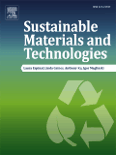
Sustainable Materials and Technologies
Pioneering Research for a Greener TomorrowSustainable Materials and Technologies is an esteemed journal published by Elsevier, focusing on pioneering research and innovative solutions in the fields of industrial engineering, materials science, and environmental sustainability. With a prestigious Q1 ranking in multiple relevant categories—including Industrial and Manufacturing Engineering, Materials Science, Renewable Energy, Sustainability, and Waste Management—this journal is positioned as a leading platform for disseminating high-impact research that addresses pressing challenges in material sustainability. Recognized for its rigorous peer-review process and commitment to academic excellence, Sustainable Materials and Technologies is dedicated to providing open access to groundbreaking studies and practical methodologies that drive forward the agenda for a sustainable future. Since its inception in 2014, the journal has been integral for professionals, researchers, and students who are engaged in the quest for innovative materials and technologies that minimize ecological footprints. Join a community at the forefront of sustainability science by contributing to and engaging with the transformative research published in this pivotal journal.
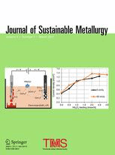
Journal of Sustainable Metallurgy
Fostering impactful dialogue on material sustainability.Journal of Sustainable Metallurgy is a leading academic journal published by Springer, dedicated to advancing knowledge in the field of sustainable metallurgy and material sciences. With an ISSN of 2199-3823 and E-ISSN 2199-3831, this journal occupies a pivotal role in the intersection of Environmental Science, Materials Science, and Engineering, boasting a commendable impact factor and significant visibility in scholarly discussions. Operating under a Q2 category in 2023 across various rankings, including Environmental Science and Mechanics of Materials, it provides valuable insights for researchers, industry professionals, and students focusing on sustainable practices in metallurgy. The journal's aim is to disseminate high-quality research that addresses the technical challenges and innovations in material sustainability from 2015 to 2024. Through robust peer-review processes, it ensures the dissemination of rigorous research, fostering an informed dialogue within the global materials community. For those interested in open access options, please refer to the publisher's website for more information.
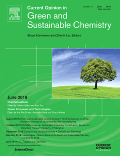
Current Opinion in Green and Sustainable Chemistry
Elevating Perspectives on Green and Sustainable ChemistryCurrent Opinion in Green and Sustainable Chemistry, published by Elsevier, is a premier journal dedicated to exploring the rapidly evolving field of green and sustainable practices in chemistry. With an impressive Q1 ranking in multiple categories, including Catalysis, Process Chemistry and Technology, and Waste Management, this journal plays a pivotal role in disseminating innovative research by providing critical insights into sustainable methodologies and their implementation across various industries. The journal aims to gather leading perspectives from experts to facilitate knowledge exchange that drives the global transition towards more sustainable chemical practices. Based in the Netherlands, Current Opinion in Green and Sustainable Chemistry emphasizes high impact, evidenced by its Scopus ranks, notably achieving the 10th percentile in Environmental Science Management, making it indispensable for researchers and professionals keen on advancing sustainable chemistry solutions. This journal offers a blend of open access articles and subscription-based content, ensuring a wide reach and engagement with its audience.

Waste Management
Transforming waste challenges into sustainable solutions.Waste Management, published by Pergamon-Elsevier Science Ltd, stands as a premier journal in the field of waste management and disposal, reflecting its esteemed position with an impressive 2023 impact factor and ranking in the Q1 category. This journal is pivotal for researchers, professionals, and students, offering a rich repository of innovative studies and methodologies aimed at addressing the increasingly critical challenges in waste management. With a dedicated focus on advancing knowledge and practice in environmental science, it encompasses a wide array of topics from waste reduction techniques to sustainable disposal strategies. Founded in 1983, Waste Management continues to be at the forefront of academic discourse, providing invaluable insights into both theoretical frameworks and practical applications, thus playing a vital role in shaping the future of waste disposal practices worldwide.

RUSSIAN METALLURGY
Pioneering Research in Metallurgy Since 1984RUSSIAN METALLURGY is a distinguished journal published by PLEIADES PUBLISHING INC, focusing on the fields of metals and alloys. With an ISSN of 0036-0295 and an E-ISSN of 1555-6255, this journal serves as a vital resource for researchers and practitioners alike, offering insights into the latest advancements and innovative research within the metallurgy domain. Recognized in a competitive landscape, it holds a Q3 ranking in the Metals and Alloys category as of 2023, reflecting its commitment to rigorous scientific dissemination. The journal spans a significant historical timeline of research since its inception in 1984, with aims to advance the knowledge and application of metallurgical science. Although currently not open access, it remains crucial for those aiming to stay current in the dynamic field of materials science. RUSSIAN METALLURGY fosters a deeper understanding of the physical and chemical properties of metals, guiding future innovations in industry and academia.

JOURNAL OF THE AMERICAN LEATHER CHEMISTS ASSOCIATION
Connecting researchers and practitioners in leather chemistry.JOURNAL OF THE AMERICAN LEATHER CHEMISTS ASSOCIATION, published by the American Leather Chemists Association, serves as a cornerstone for research and development in the leather industry. With an ISSN of 0002-9726, this journal has been disseminating valuable findings since its first publication in the late 1960s, continuing through 2024. Despite being categorized within the Q4 quartile in fields such as Chemical Engineering, Chemistry, and Materials Science, it plays a crucial role in fostering innovation and addressing challenges faced by professionals in leather chemistry and technology. Researchers and practitioners alike will find an array of studies and discussions that bridge theoretical research and practical applications. Although not an open-access journal, it prioritizes accessibility and aims to keep pace with emerging trends in leather science, ensuring that it remains relevant in an evolving marketplace. Whether you are a seasoned professional or a budding student, this journal is indispensable for advancing your understanding of leather chemistry.
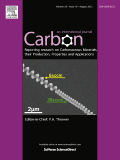
CARBON
Unveiling the Potential of Carbon ResearchCARBON is a leading peer-reviewed journal published by PERGAMON-ELSEVIER SCIENCE LTD, focusing on the realms of Chemistry and Materials Science. With an impressive impact factor, CARBON is ranked within the top quartile (Q1) of both fields in the 2023 Scimago Journal Rank, remarkably securing the 18th position out of 463 in General Materials Science and the 22nd position out of 408 in General Chemistry. Since its inception in 1963, the journal has been dedicated to publishing high-quality research that advances the understanding of carbon-based materials and their applications. Operating from the United Kingdom, CARBON provides an essential platform for researchers, professionals, and students alike to disseminate their findings and innovations. Although not an open-access journal, it offers access options that maintain the integrity and high standards of academic publishing. As a critical resource in its field, CARBON continues to foster scientific dialogue and development, significantly impacting current and future research.
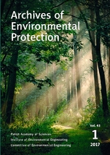
Archives of Environmental Protection
Innovative Insights for a Sustainable FutureArchives of Environmental Protection, published by the Polish Academy of Sciences, is a pivotal journal in the field of Environmental Science. With an ISSN of 2083-4772 and E-ISSN of 2083-4810, this journal serves as a critical platform for disseminating innovative research and comprehensive reviews that address the complexities surrounding environmental issues. As of 2023, it holds a respectable Q3 ranking in Environmental Science, reflecting its relevance and contribution to the academic community, indicated by a Scopus rank of 124 out of 233 in the General Environmental Science category. Although it operates without Open Access, the journal's consistent publication from 2007 to 2024 emphasizes its commitment to advancing knowledge in diverse areas of environmental protection. Researchers, professionals, and students are encouraged to engage deeply with the wealth of insights offered through the rigorous peer-reviewed articles presented in this journal, which strive to foster sustainable practices and environmental stewardship.
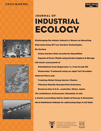
JOURNAL OF INDUSTRIAL ECOLOGY
Championing Interdisciplinary Approaches to Industrial EcologyJOURNAL OF INDUSTRIAL ECOLOGY, published by Wiley, is a leading academic journal that focuses on the intersection of industrial practices and ecological sustainability. With an ISSN of 1088-1980 and an E-ISSN of 1530-9290, this journal has established itself as a premier outlet for research in economic, environmental, and social sciences, evidenced by its Q1 rankings in key categories such as Economics and Econometrics, Environmental Science, and General Social Sciences as of 2023. Spanning over two decades from 1997 to 2024, it offers invaluable insights into innovative approaches for designing sustainable industrial systems, informing policy decisions, and advancing interdisciplinary collaborations. While the journal does not currently offer open access options, its high impact in the field—illustrated by its impressive Scopus rankings, where it ranks 5th among 275 in General Social Sciences and 23rd among 233 in General Environmental Science—reinforces its importance to researchers, professionals, and students dedicated to the principles of sustainable development and industrial ecology.
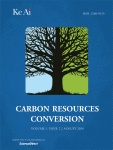
Carbon Resources Conversion
Exploring the Frontiers of Carbon Resource ScienceCarbon Resources Conversion is a prominent interdisciplinary journal that focuses on the innovative aspects of carbon resource utilization, aiming to advance research and applications in catalysis, fuel technology, and materials science. Published by KEAI PUBLISHING LTD, this Open Access journal, established in 2018, has rapidly developed a reputation for its high-quality research, evident from its impressive quartile rankings in 2023, including Q2 in Catalysis and Q1 in both Fuel Technology and Materials Science (miscellaneous). With its dedicated editorial board and rigorous peer-review process, Carbon Resources Conversion serves as an essential platform for researchers, professionals, and students striving to address contemporary challenges in energy and materials sustainability. The journal's strong Scopus rankings reaffirm its influence and accessibility within the scientific community, making it a vital resource for advancing the knowledge and application of carbon resource conversion processes.